Elise Cutts

Trustworthy journalism comes at a price.
Scientists and journalists share a core belief in questioning, observing and verifying to reach the truth. Science News reports on crucial research and discovery across science disciplines. We need your financial support to make it happen – every contribution makes a difference.
All Stories by Elise Cutts
-
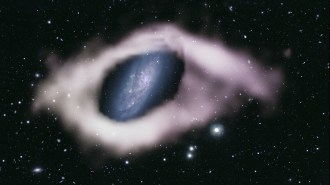 Astronomy
AstronomyThis ‘polar ring’ galaxy looks like an eye. Others might be hiding in plain sight
New images of two galaxies reveal what look like rarely seen rings of hydrogen gas nearly perpendicular to the galaxies’ starry disks.
-
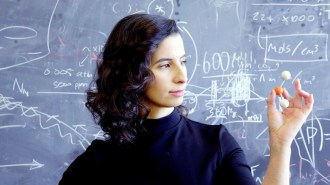 Space
SpaceClara Sousa-Silva seeks molecular signatures of life in alien atmospheres
Quantum astrochemist Clara Sousa-Silva studies how molecules in space interact with light, offering clues to what distant objects are made of.
-
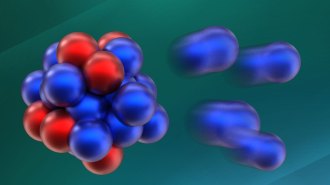 Particle Physics
Particle PhysicsScientists finally detected oxygen-28. Its instability surprised them
The elusive isotope was predicted to be very stable, thanks to “magic” numbers of neutrons and protons. It fell apart almost immediately.
-
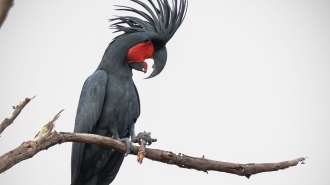 Animals
AnimalsWild male palm cockatoos rock out with custom drumsticks
Along with flashy dances and distinctive drumbeats, these birds craft their own signature drumsticks to win over mates.
-
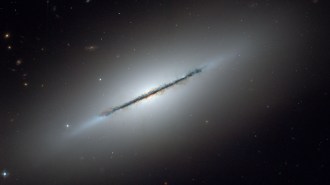 Astronomy
AstronomySpiral galaxies might have been lentil-shaped before becoming starry whirls
By using black holes to track how galaxies merge and grow, an astronomer has proposed an update to the prevailing story of how galaxy shapes evolve.
-
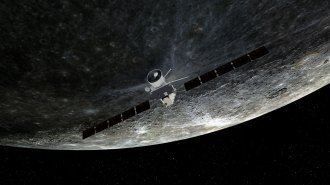 Planetary Science
Planetary ScienceA rain of electrons causes Mercury’s X-ray auroras
The first direct measurement of electrons raining down on Mercury suggests this particle precipitation causes most auroras in the solar system.
-
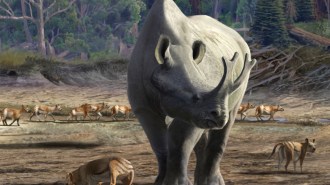 Paleontology
Paleontology‘Thunder beast’ fossils show how some mammals might have gotten big
Rhinolike mammals called brontotheres repeatedly evolved into bigger and smaller species, a fossil analysis shows. The bigger ones won out over time.
-
 Neuroscience
NeuroscienceYour brain wires itself to match your native language
MRI scans of nearly 100 native speakers of either German or Arabic revealed differences in how the language circuits of their brains are connected.
-
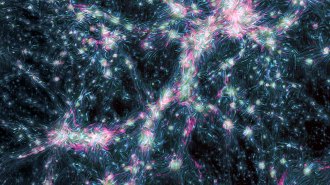 Cosmology
CosmologyAstronomers spotted shock waves shaking the web of the universe for the first time
Studying these elusive shock waves could give scientists a better look at the mysterious magnetic fields that permeate the cosmic web.
-
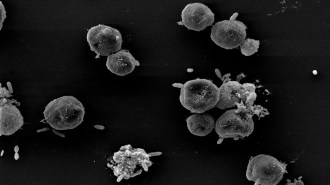 Microbes
MicrobesSome ‘friendly’ bacteria backstab their algal pals. Now we know why
The friendly relationship between Emiliana huxleyi and Roseobacter turns deadly when the bacteria get a whiff of the algae’s aging-related chemicals.
-
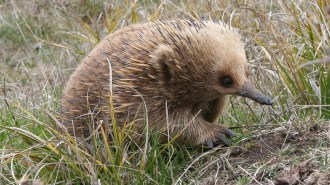 Animals
AnimalsThese adorable Australian spike-balls beat the heat with snot bubbles
An echidna’s snot bubbles coat the spiny critter’s nose with moisture, which then evaporates and draws heat from the sinus, cooling the blood.
-
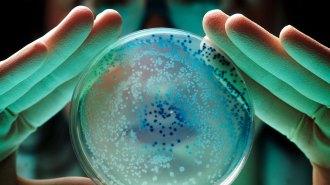 Health & Medicine
Health & MedicineHere’s how mysterious last-resort antibiotics kill bacteria
Scientists are finally getting a grip on how a class of last-resort antibiotics works — the drugs kill bacteria by crystallizing their membranes.